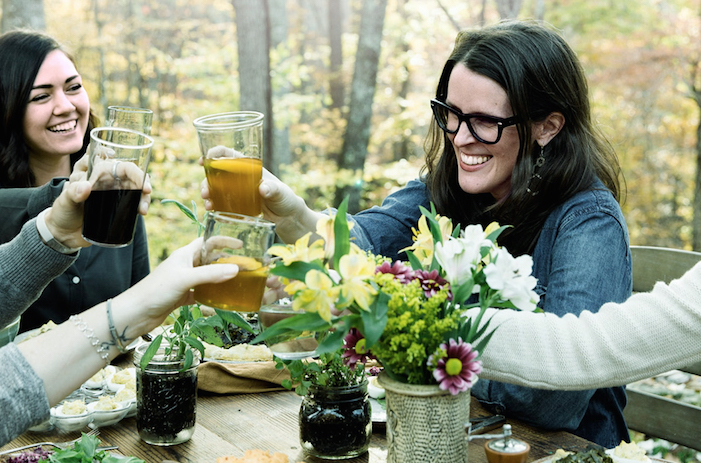As a child visiting her grandmother’s farm in Virginia, Asheville-area native Ashley English learned how to prepare real food. From the fresh blueberries that grew on her grandmother’s farm to the eggs laid by her chickens, she was raised on fresh, unadulterated foods.
After graduating from Charles D. Owen High School, she went to college with the anticipation of becoming a fashion designer in New York. Instead, she landed in Washington, D.C., where she met a friend whose political activism kindled something in her. At the same time, she was becoming increasingly interested in food and food policy.
“Somehow, fashion design began to mean less to me and food began to mean more,” English says. “I came back to Asheville to go back to school, and now I have degrees in nutrition and sociology.”
English, who lives on 11 acres in Candler, has written seven books on food and homesteading. She and her publisher, Roost Books, will celebrate the recent softcover release of her book Handmade Gatherings ($24.95, Roost Publishing) on Father’s Day with a community potluck at the Carrier Park Picnic Pavilion.
Copies of Handmade Gatherings will be available at the party, and English will sign them for buyers. “I know it’s Father’s Day,” English writes on the event’s Facebook page, “so bring your Pops with you. All the restaurants will be overcrowded with brunchers anyways.”
The book contains recipes and décor and craft ideas for 16 seasonal potluck celebrations, and the photos are all from the parties she created here in Asheville to research the book. Her husband, Glenn, works full time helping her research for her books, and of course, taste-testing her recipes.
Because everyone needs to eat, shared meals are a great way to build community, English says, and sharing foods also helps people learn about foods they may not have tried before. “My son is just 5½, but he already has a pretty sophisticated palate,” she says. “His favorite ethnic foods are Indian and Japanese. We think he probably was Asian in a previous life.”
One thing that makes potluck attractive is that it’s less expensive to host than a traditional dinner party because, like the food, the cost is shared. “You don’t have to have the resources of Martha Stewart to have a great shared meal,” she says. “It’s a shared responsibility and a shared experience. A potluck, by definition, is shared food.”
English put together her first potluck at age 10 and continued to have potluck dinners for virtually every celebration in her life. The recipes in Handmade Gatherings are simple and made with easily obtained fresh seasonal ingredients, such as peaches and berries in summertime, apples in autumn and dried fruits in winter.
For many years, the materials for do-it-yourself projects like the crafts described in Handmade Gatherings — think handmade pinwheels, jars of dried soup mix and premixed mulling spices in simple muslin bags — were difficult to find. But recently, English says, she has seen things like canning jars and other items make a return to grocery store shelves.
And potlucks seem to be increasingly popular among young adults, English says. “I think millennials tend to socialize more in their homes. Their budgets tend to be tight, and they do more of the work themselves.”
In addition, scratch-made foods tend to be healthier than store-bought, and English says she sees major food manufacturers changing their products in response to consumer demand. For example, last August, Kellogg’s announced it would remove all artificial colorings and flavors from its cereals by the end of 2018. Other companies, including Panera, General Mills and Taco Bell, also have announced they would remove artificial ingredients and preservatives from their foods.
“Food is health,” English says. “The underlying ethos of everything I do is healthy foods and building community.”
The activities described in Handmade Gatherings are purposely uncomplicated so readers won’t be frustrated by time-consuming preparations. One suggestion for a theme is a cakewalk, for which guests bring something homemade (it doesn’t have to be a cake). Each guest is assigned a number, and that person’s gift goes into a bag with the corresponding number on the front. Each number also is written on a slip of paper and placed in a basket. Start the music and when the music stops, pull a number from the basket, and the person standing in front of that number wins the gift. In the end, each participant has a gift that was handmade by someone else.
Among the recipes for that same potluck are a collard green galette, bourbon iced tea, peach sonker (similar to a cobbler) and pimento cheese dip.
English has three more books in the works, including A Year of Picnics and The Essential Book of Homesteading, both due to be released in April 2017.
To learn more about English, visit her website, smallmeasure.com, or look for “Small Measure” on Facebook.




The term “cakewalk” is generally accepted to be a holdover from the institution of slavery in the Southern United States. I believe a different term would be useful!
Here is a Wikipedia link for further details:
https://en.m.wikipedia.org/wiki/Cakewalk